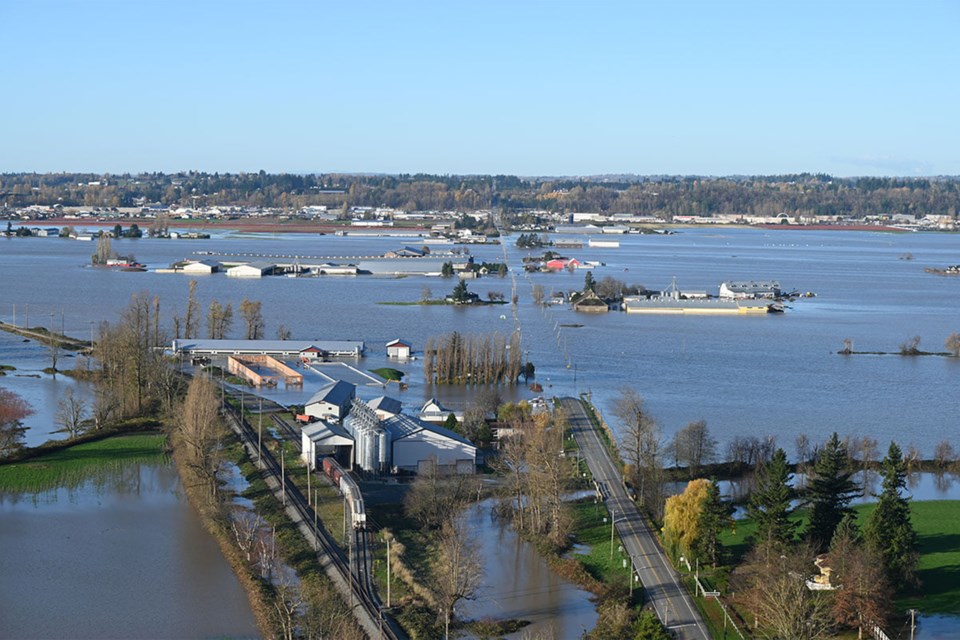OLDS — A local couple who were returning home this week from a roughly month-long visit to B.C. when the province was slammed by torrential rainfall that caused flooding and washed away sections of highways, just narrowly managed to get ahead of a quickly deteriorating situation that went from bad to catastrophic.
“We were kind of on the front edge of it getting worse and worse and worse,” said Jim Smith, who accompanied by wife Hazel had been visiting family and friends in Vancouver and other parts of Canada’s westernmost province.
But their long voyage back to Olds was nevertheless cut short when they decided to err one the side of caution and sought shelter along the way, finding refuge in Salmon Arm to wait out the worst of the storm that left many people stranded and cut B.C. off from the rest of the country when a portion of the Coquihalla Highway crumbled away as a result of substantial erosion.
Heading out in the late morning hours of Sunday, Nov. 14 from the Vancouver metropolitan area where they’d been visiting one of their two sons and his family, the couple continued as long as they could well into the night, said Smith, calling the trek “a challenging drive all the way through.”
Recollecting perhaps the most harrowing part of their experience, Smith said they barely got through a section of highway near Vancouver between Chilliwack and Hope.
“At that point, there was a road crew still offering one lane to go through,” he said on Tuesday, Nov. 16 during a phone interview. “I was surprised, actually, given how difficult that was. But I think they closed that very, very quickly thereafter because I didn’t have much traffic behind me for a long time.”
That involved driving through a strong flow of water over a partially flooded highway.
“Of course you can’t see what you’re going through,” he said.
All things considered, Smith felt fortunate that they were able to make it through physically unscathed. Their vehicle, however, wasn’t quite as lucky.
“Our only significant casualty was a lost muffler,” he said, recalling “raging water crossing the highway.”
While the worst was behind them, their unexpected ordeal had just begun and they remained a long way from home.
“The rest of it was just miserable driving,” said Smith, adding there was no shortage of debris scattered over the roads in areas with overland flooding from time to time in others.
“Little bits of mud and rock here and there that we were able to avoid,” he said.
“I think we were probably about the last vehicle that might have made it through some water erosion on the highway near a place called Bridal Falls, which is on the west side of Hope.”
And by the time they reached the Coquihalla Highway, the road had already been closed. Once eastbound travellers reach Hope, they can either take the Coquihalla Highway or an older, more scenic, twisting and winding route.
“It was suggested we take Highway 3, which is known as the Hope Princeton Highway, and so off we went.”
The rain continued to fall the whole time and he had to remain vigilant of debris on the road, he said.
“Basically, as the day went on, the environment grew worse, if you will, in terms of highway destruction.”
As they made their way through Princeton, Smith said, “It was becoming evident that there was going to be an awful lot of water going through there. They had emergency services directing traffic through the community onto the highway that would then lead north to Merritt.”
Once again managing to just barely stay ahead of the rapidly devolving situation, they were able to get through Merritt — which was subsequently flooded and evacuated — to reconnect with Highway 1, also known as the TransCanada Highway.
“We drove east in hopes that we would get a lot farther along the way,” he said. “But by the time we reached Salmon Arm, we had information that there was a highway closure a little bit further along the line, just past a little place called Sicamous.”
That was when the couple decided to find a hotel and hunker down for the night in Salmon Arm.
“We’re so grateful — we’re safe and dry and well fed, unlike a whole lot of people who got stranded,” said Smith, referring to those who were evacuated either from their homes or vehicles on highways that were cut off.
“We feel fortunate that we got through where we did. By the time we were nearing the end of our journey, you could see the traffic had gotten heavier and heavier and slower and slower,” he said, presuming that was largely the result of westbound traffic that had been diverted from the Coquihalla Highway being funnelled onto the alternate route.
Although the couple had not anticipated spending more than one night in Salmon Arm, they remained there for three with the hopes of getting back on the road the next morning.
“I decided that rather than pushing it, we’d give the hard-working highways people the day to continue to try and do some restoration where they need to, and stay out of their way,” he said. “We’re anxious to get back on the road, but we’re trying to be patient.”
Meanwhile, their sons Keegan and Calum Smith and their families — who live between Merritt and Kamloops as well as New West Minster, respectively — were also safe and well throughout the wild weather.



